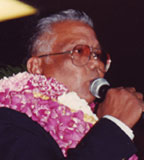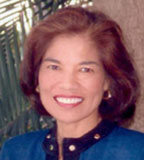
| Talk Story With... | Mabuhay Stories i Education Projects i Centennial Timeline |
Angela Baraquio, Miss America 2001 "It's about the fact that a Filipina can make a difference." Robin Campaniano, CEO, AIG Hawaii "The state was built on the backs of Filipinos." Roland Casamina, Filipino Community Center "I got here fresh off the bat. We dressed funny. We had a heavy accent." Eduardo Malapit, first Filipino-American Mayor "I gave politics a good Filipino start" Chris Pablo, Kaiser Permanente "We were constantly reminde of who we are, where we're from." Abelina Madrid Shaw, Immigration Attorney "We have to learn about hard work and survival instincts from those who came before us."
|
My mom is from Manila and my father is from Pangasinan. His province is Bocboc, Aguilar, Pangasinan. So people laugh: You’re dad’s from bukbuk? They met as teachers when they were in their 20’s and they ended up getting married. They had three children in the Philippines and they came to Hawaii because my mom’s mother, my grandma, was here. So they basically up and left everything they knew over there to start a new life, to search for a better life for our family. They had seven more kids as they lived here so we have 10 kids in the family. They put all 10 of us through Catholic schools, they put all of us through college. When I won Miss America, the organization’s CEO asked me: Do you want to go to the Philippines? I said of course I’d love to go, but the contingency is that my parents get to go with me. So we had a big sponsor, which was Northwest Airlines, and they came with me and it was a huge homecoming. It was my first time ever going back there. I got to meet my grandfather, who was 80 years old, for the first time. It was funny because we were celebrating 80 years of the pageant’s history. I always looked at Miss America and thought: Wow, these ladies are so beautiful and talented and intelligent, but they don’t look like me. They’re tall, blond hair and blue eyes. I’m 5’4”, I’m Filipina. I never thought I had a chance. So to be standing on that stage and to be walking the runway as the first Asian Miss America in the history of the pageant was really something to be proud of. It’s not about me. It’s about the fact that a Filipina can do this. A Filipina from immigrant parents can make a difference, can make national and international headlines. A Filipino governor, the only governor that is Filipino in the nation, can come from Hawaii. That’s a big deal. Robin Campaniano, President, AIG Hawaii My grandfather came to Hawaii like many other Filipinos to work on the plantations. My father grew up at first on a plantation camp, later on joined the military to see the world. I grew up learning about Japanese (mother) and Filipino (father) cultures, not necessarily being very strong or feeling that powerful about either one. I think my experience at the University of Hawaii was an eye opening one. It was at a time when everybody started exploring their ethnic backgrounds. We have a continuing wave of immigration so when we talk of the Filipino community we’re talking again about 2nd, 3rd, perhaps 4th generation as well as people who are just now coming to the states from the Philippines. With that, we’ve got such a tremendous mix of problems and opportunities. Sometimes, Filipinos rue the fact that there are not more visible leaders or prominent people. I’ve always viewed that there are just wonderful people who happen to be Filipino filling every single conceivable role in the state. That’s the neat thing about the Filipino community—they have become Hawaii. They are part and parcel of Hawaii. Roland Casamina, President Emeritus, FilCom Center As soon as I got here—you might call it “fresh off the boat,” the first big shocker for me was (seeing) all the other ethnic groups. Somehow I envisioned only white Americanos, So a lot of our friends said: By the way, I’m Chinese-Filipino or I’m Spanish-Chinese and then Filipino. It’s a good thing I had some cousins who were born here. They’d say: That’s my cousin don’t touch him. Immediately after school at the age of 14, I found a man who was willing to hire kids to clean the offices at the old airport and he would pay cash. I did that five days a week. Then on weekends, I would clean yard. Then I worked in Waikiki as a bus boy. That is one of the best experiences that I ever had. I hung around Ft. DeRussy officers club. Instead of learning pidgin, I learned straight English from them.
It was hard (to break into politics) because plantations were Republicans and the political structure the Democrats was primarily Japanese. When I first went to the Democratic party, (they were wondering): Here’s this Filipino. Why was I there? But I wanted to be a Democrat. When I ran for the Kauai Council, I had my friends and my family and my classmates. I became the number one vote getter, then I became stronger and stronger. I gave politics a good Filipino beginning. Filipinos are pretty strong politically. Chris Pablo, Executive, Kaiser Permanente Hawaii For the first four days of his working life in Hawaii, my father carried these heavy water tubs for the plantation workers. He was an 80-pound weakling and that was not for him. He found another job at the pineapple plantation in Waimea. He was a great salesman. His customers were the plantation workers. He sold them photographs, watches, jewelry, washing machines, sewing machines, and later on insurance. My mother came to Hawaii following her father, who was a contract laborer. When she got here with my grandmother and her sister, they couldn’t find grandpa because he had come in under an assumed name, took the place of another contract laborer who had cold feet. My parents spoke Ilocano to us. Unfortunately we weren’t required to respond in Ilocano but we understood the language. We were constantly reminded of who we are, where we’re from, where our parents are from. My parents also enrolled my brother and me in dancing lessons. We learned how to do dance from Ms. (Aurelia) Viernes (of the Filipiniana Dance Company). I think it’s very important for everyone to have a sense of who they are and where they’re from. It’s holding on to your cultural, your language, your values…then step comfortably in a larger society. I think for me it has been a very stabilizing impact in my life and in my development. Abelina Madrid Shaw, Attorney, former City cabinet member
A year later mom came with two of my sisters and my brother. We all settled down in the plantation camp in Hanamalu. There we were afforded the kinds of the things that were promised: work at 43 cents an hour, medical services, public education. My dad and other men who traveled here, they were adventurers, they had this adventurous spirit and inner strength. I went to law school in 1973, and I was part of the first graduating class. Many Filipinos have succeeded today, (but) they will never know they will never learn unless you to tell them through books and documentaries the kind of hard work and survival instincts that’s necessary to live in the world.
|
 I was born in Hanapepe on Kauai with a mid wife. Then they brought me to Kaumakani plantation hospital. My father used to read the newspaper and Life Magazine and he used to let me read them and he said you’re going to be an attorney when I was 5 or 6 years old. I took up band. He took me out of band and put me in study hall because he said you’re going to be a student, a lawyer, not a musician. My father was an interpreter and personnel clerk at the office.
I was born in Hanapepe on Kauai with a mid wife. Then they brought me to Kaumakani plantation hospital. My father used to read the newspaper and Life Magazine and he used to let me read them and he said you’re going to be an attorney when I was 5 or 6 years old. I took up band. He took me out of band and put me in study hall because he said you’re going to be a student, a lawyer, not a musician. My father was an interpreter and personnel clerk at the office. Dad left three children and his wife, who was 26 years old at that time in 1946. Nobody wanted him to leave but he was promised all these opportunities. He signed a contract
Dad left three children and his wife, who was 26 years old at that time in 1946. Nobody wanted him to leave but he was promised all these opportunities. He signed a contract